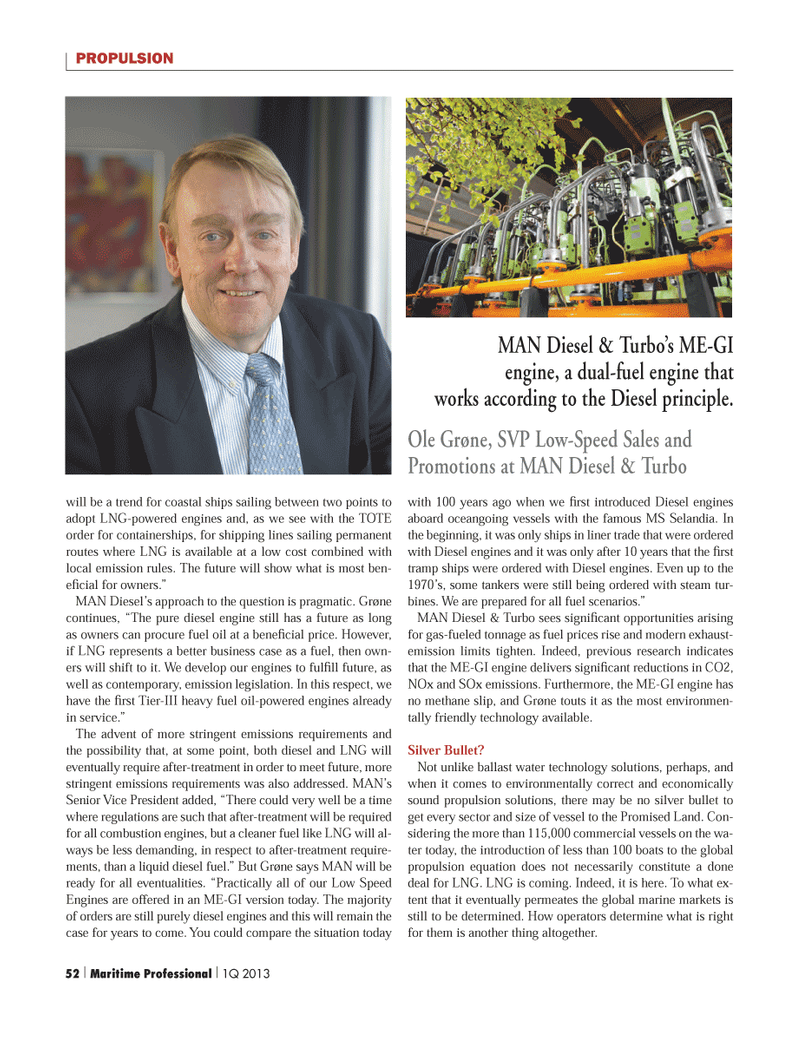
Page 52: of Maritime Logistics Professional Magazine (Q1 2013)
Maritime Risk
Read this page in Pdf, Flash or Html5 edition of Q1 2013 Maritime Logistics Professional Magazine
PROPULSION will be a trend for coastal ships sailing between two points to adopt LNG-powered engines and, as we see with the TOTE order for containerships, for shipping lines sailing permanent routes where LNG is available at a low cost combined with local emission rules. The future will show what is most ben- eÞ cial for owners.Ó MAN DieselÕs approach to the question is pragmatic. Gr¿ne continues, ÒThe pure diesel engine still has a future as long as owners can procure fuel oil at a beneÞ cial price. However, if LNG represents a better business case as a fuel, then own- ers will shift to it. We develop our engines to fulÞ ll future, as well as contemporary, emission legislation. In this respect, we have the Þ rst Tier-III heavy fuel oil-powered engines already in service.Ó The advent of more stringent emissions requirements and the possibility that, at some point, both diesel and LNG will eventually require after-treatment in order to meet future, more stringent emissions requirements was also addressed. MANÕs Senior Vice President added, ÒThere could very well be a time where regulations are such that after-treatment will be required for all combustion engines, but a cleaner fuel like LNG will al- ways be less demanding, in respect to after-treatment require- ments, than a liquid diesel fuel.Ó But Gr¿ne says MAN will be ready for all eventualities. ÒPractically all of our Low Speed Engines are offered in an ME-GI version today. The majority of orders are still purely diesel engines and this will remain the case for years to come. You could compare the situation today with 100 years ago when we Þ rst introduced Diesel engines aboard oceangoing vessels with the famous MS Selandia. In the beginning, it was only ships in liner trade that were ordered with Diesel engines and it was only after 10 years that the Þ rst tramp ships were ordered with Diesel engines. Even up to the 1970Õs, some tankers were still being ordered with steam tur- bines. We are prepared for all fuel scenarios.Ó MAN Diesel & Turbo sees signiÞ cant opportunities arising for gas-fueled tonnage as fuel prices rise and modern exhaust- emission limits tighten. Indeed, previous research indicates that the ME-GI engine delivers signiÞ cant reductions in CO2, NOx and SOx emissions. Furthermore, the ME-GI engine has no methane slip, and Gr¿ne touts it as the most environmen- tally friendly technology available. Silver Bullet? Not unlike ballast water technology solutions, perhaps, and when it comes to environmentally correct and economically sound propulsion solutions, there may be no silver bullet to get every sector and size of vessel to the Promised Land. Con- sidering the more than 115,000 commercial vessels on the wa- ter today, the introduction of less than 100 boats to the global propulsion equation does not necessarily constitute a done deal for LNG. LNG is coming. Indeed, it is here. To what ex- tent that it eventually permeates the global marine markets is still to be determined. How operators determine what is right for them is another thing altogether. MAN Diesel & Turbo?s ME-GI engine, a dual-fuel engine that works according to the Diesel principle. Ole Grøne, SVP Low-Speed Sales and Promotions at MAN Diesel & Turbo 52 | Maritime Professional | 1Q 2013MP #4 50-63.indd 52MP #4 50-63.indd 522/25/2013 9:58:39 AM2/25/2013 9:58:39 AM

 51
51

 53
53
